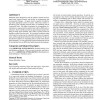1225 search results - page 145 / 245 » Design Principles for Intelligent Environments |
124
click to vote
CANDC
2005
ACM
15 years 4 months ago
2005
ACM
In this paper, we discuss how a cognitive concept, causality, can be used for the conceptual underpinning of Virtual Reality Art installations. Causality plays an important role i...
115
click to vote
ATAL
2008
Springer
15 years 4 months ago
2008
Springer
Intelligent agents designed to work in complex, dynamic environments must respond robustly and flexibly to environmental and circumstantial changes. An agent must be capable of de...
130
click to vote
ESAW
2009
Springer
15 years 9 months ago
2009
Springer
Abstract. The deployment of agent societies —as complex systems— in dynamic and unpredictable settings brings forth critical issues concerning their design. Organizational mode...
127
Voted
ATAL
2008
Springer
15 years 4 months ago
2008
Springer
In most of the existing approaches to the design of multiagent systems, there is no clear way in which to relate organisational and normative structures to the model of the enviro...
ATAL
2006
Springer
15 years 6 months ago
2006
Springer
We report on our ongoing practical experience in designing, implementing, and deploying PTIME, a personalized agent for time management and meeting scheduling in an open, multi-ag...

